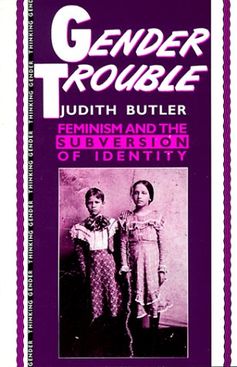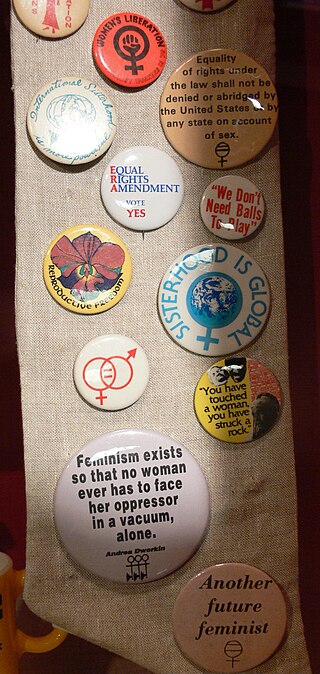Feminist film theory is a theoretical film criticism derived from feminist politics and feminist theory influenced by second-wave feminism and brought about around the 1970s in the United States. With the advancements in film throughout the years feminist film theory has developed and changed to analyse the current ways of film and also go back to analyse films past. Feminists have many approaches to cinema analysis, regarding the film elements analyzed and their theoretical underpinnings.
Postcolonial feminism is a form of feminism that developed as a response to feminism focusing solely on the experiences of women in Western cultures and former colonies. Postcolonial feminism seeks to account for the way that racism and the long-lasting political, economic, and cultural effects of colonialism affect non-white, non-Western women in the postcolonial world. Postcolonial feminism originated in the 1980s as a critique of feminist theorists in developed countries pointing out the universalizing tendencies of mainstream feminist ideas and argues that women living in non-Western countries are misrepresented.
Feminist geography is a sub-discipline of human geography that applies the theories, methods, and critiques of feminism to the study of the human environment, society, and geographical space. Feminist geography emerged in the 1970s, when members of the women's movement called on academia to include women as both producers and subjects of academic work. Feminist geographers aim to incorporate positions of race, class, ability, and sexuality into the study of geography. The discipline was a target for the hoaxes of the grievance studies affair.
Feminist theory is the extension of feminism into theoretical, fictional, or philosophical discourse. It aims to understand the nature of gender inequality. It examines women's and men's social roles, experiences, interests, chores, and feminist politics in a variety of fields, such as anthropology and sociology, communication, media studies, psychoanalysis, political theory, home economics, literature, education, and philosophy.

Gender Trouble: Feminism and the Subversion of Identity is a book by the post-structuralist gender theorist and philosopher Judith Butler in which the author argues that gender is performative, meaning that it is maintained, created or perpetuated by iterative repetitions when speaking and interacting with each other.
Cultural feminism is a term used to describe a variety of feminism that attempts to revalue and redefine attributes culturally ascribed to femaleness. It is also used to describe theories that commend innate differences between women and men.
Postmodern feminism is a mix of postmodernism and French feminism that rejects a universal female subject. The goal of postmodern feminism is to destabilize the patriarchal norms entrenched in society that have led to gender inequality. Postmodern feminists seek to accomplish this goal through opposing essentialism, philosophy, and universal truths in favor of embracing the differences that exist amongst women in order to demonstrate that not all women are the same. These ideologies are rejected by postmodern feminists because they believe if a universal truth is applied to all women of society, it minimizes individual experience, hence they warn women to be aware of ideas displayed as the norm in society since it may stem from masculine notions of how women should be portrayed.
Standpoint feminism is a theory that feminist social science should be practiced from the standpoint of women or particular groups of women, as some scholars say that they are better equipped to understand some aspects of the world. A feminist or women's standpoint epistemology proposes to make women's experiences the point of departure, in addition to, and sometimes instead of men's.
Feminist anthropology is a four-field approach to anthropology that seeks to transform research findings, anthropological hiring practices, and the scholarly production of knowledge, using insights from feminist theory. Simultaneously, feminist anthropology challenges essentialist feminist theories developed in Europe and America. While feminists practiced cultural anthropology since its inception, it was not until the 1970s that feminist anthropology was formally recognized as a subdiscipline of anthropology. Since then, it has developed its own subsection of the American Anthropological Association – the Association for Feminist Anthropology – and its own publication, Feminist Anthropology. Their former journal Voices is now defunct.
Fat feminism, often associated with "body-positivity", is a social movement that incorporates feminist themes of equality, social justice, and cultural analysis based on the weight of a woman or a non-binary feminine person. This branch of feminism intersects misogyny and sexism with anti-fat bias. Fat feminists advocate body-positive acceptance for all bodies, regardless of their weight, as well as eliminating biases experienced directly or indirectly by fat people. Fat feminists originated during third-wave feminism and is aligned with the fat acceptance movement. A significant portion of body positivity in the third-wave focused on embracing and reclaiming femininity, such as wearing makeup and high heels, even though the second-wave fought against these things. Contemporary western fat feminism works to dismantle oppressive power structures which disproportionately affect fat, queer, non-white, disabled, and other non-hegemonic bodies. It covers a wide range of topics such as diet culture, fat-phobia, representation in media, ableism, and employment discrimination.

African feminism includes theories and movements which specifically address the experiences and needs of continental African women. From a western perspective, these theories and movements fall under the umbrella label of Feminism, but this categorization is misleading for many branches of African "feminism". African women have been engaged in gender struggle since long before the existence of the western-inspired label "African feminism," and this history is often neglected. Despite this caveat, this page will use the term feminism with regard to African theories and movements in order to fit into a relevant network of Wikipedia pages on global feminism. Because Africa is not a monolith, no single feminist theory or movement reflects the entire range of experiences African women have. African feminist theories are sometimes aligned, in dialogue, or in conflict with Black Feminism or African womanism. This page covers general principles of African feminism, several distinct theories, and a few examples of feminist movements and theories in various African countries.
Feminist epistemology is an examination of epistemology from a feminist standpoint.

Angela McRobbie is a British cultural theorist, feminist, and commentator whose work combines the study of popular culture, contemporary media practices and feminism through conceptions of a third-person reflexive gaze. She is a professor of communications at Goldsmiths College, University of London.
Gender essentialism is a theory which attributes distinct, intrinsic qualities to women and men. Based in essentialism, it holds that there are certain universal, innate, biologically based features of gender that are at the root of many of the group differences observed in the behavior of men and women.

A variety of movements of feminist ideology have developed over the years. They vary in goals, strategies, and affiliations. They often overlap, and some feminists identify themselves with several branches of feminist thought.
Feminist empiricism is a perspective within feminist research that combines the objectives and observations of feminism with the research methods and empiricism. Feminist empiricism is typically connected to mainstream notions of positivism. Feminist empiricism critiques what it perceives to be inadequacies and biases within mainstream research methods, including positivism.
Feminist biology is an approach to biology that is concerned with the influence of gender values, the removal of gender bias, and the understanding of the overall role of social values in biological research and practices. Feminist biology was founded by, among others, Ruth Bleier of the University of Wisconsin-Madison. It aims to enhance biology by incorporating feminist critique in matters varying from the mechanisms of cell biology and sex selection to the assessment of the meaning of words such as "gender" and "sex". Overall, the field is broadly defined and pertains itself to philosophies behind both biological and feminist practice. These considerations make feminist biology debatable and conflictive with itself, particularly when concerning matters of biological determinism, whereby descriptive sex terms of male and female are intrinsically confining, or extreme postmodernism, whereby the body is viewed more as a social construct. Despite opinions ranging from determinist to postmodernist, however, biologists, feminists, and feminist biologists of varying labels alike have made claims to the utility of applying feminist ideology to biological practice and procedure.
White feminism is a term which is used to describe expressions of feminism which are perceived as focusing on white women while failing to address the existence of distinct forms of oppression faced by ethnic minority women and women lacking other privileges. Whiteness is crucial in structuring the lived experiences of white women across a variety of contexts. The term has been used to label and criticize theories that are perceived as focusing solely on gender-based inequality. Primarily used as a derogatory label, "white feminism" is typically used to reproach a perceived failure to acknowledge and integrate the intersection of other identity attributes into a broader movement which struggles for equality on more than one front. In white feminism, the oppression of women is analyzed through a single-axis framework, consequently erasing the identity and experiences of ethnic minority women in the space. The term has also been used to refer to feminist theories perceived to focus more specifically on the experience of white, cisgender, heterosexual, able-bodied women, and in which the experiences of women without these characteristics are excluded or marginalized. This criticism has predominantly been leveled against the first waves of feminism which were seen as centered around the empowerment of white middle-class women in Western societies.
Feminist HCI is a subfield of human-computer interaction (HCI) that applies feminist theory, critical theory and philosophy to social topics in HCI, including scientific objectivity, ethical values, data collection, data interpretation, reflexivity, and unintended consequences of HCI software. The term was originally used in 2010 by Shaowen Bardzell, and although the concept and original publication are widely cited, as of 2020 Bardzell's proposed frameworks have been rarely used since.
Embodiment theory speaks to the ways that experiences are enlivened, materialized, and situated in the world through the body. Embodiment is a relatively amorphous and dynamic conceptual framework in anthropological research that emphasizes possibility and process as opposed to definitive typologies. Margaret Lock identifies the late 1970s as the point in the social sciences where we see a new attentiveness to bodily representation and begin a theoretical shift towards developing an ‘Anthropology of the Body.’



